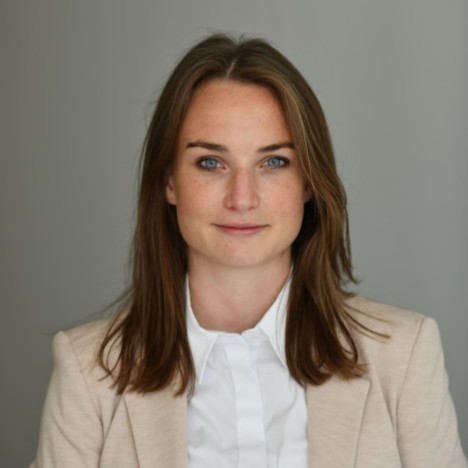
Dr Sinead Holden is an Assistant Professor (Ad Astra fellow) at the School of Public Health, Physiotherapy and Sports Science, University College Dublin (UCD). With an interest in promoting musculoskeletal health across the lifespan, Sinead integrates advanced technology into clinical research and clinical trials methodology.
Sinead grew up in Dublin and developed a strong passion for sports, exercise and science. She pursued her BSc and PhD at UCD, focusing her doctoral research on motor control development in adolescent athletes. Her work highlighted the challenges adolescents face during peak growth periods, emphasising injury prevention and the importance of strength training, particularly for girls, to mitigate the risk of traumatic knee injuries. Following this, Sinead's research extended internationally during her time in Denmark, where she worked with population-based cohorts of adolescents, enhancing her expertise in rigorous research methodologies. She also began teaching statistics to PhD students, blending her love for data analysis and mathematics with her growing experience in academia.
This led her to work in UCD’s School of Medicine with roles as both a Research Fellow at the Clinical Research Centre, and a Special Lecturer/Clinical Tutor. Today, Sinead continues to balance her research with academic responsibilities, contributing significantly to the fields of clinical research and exercise science. Her work aims to ensure that youth can enjoy sports safely and sustainably. Her academic and research career has been marked by a commitment to the human side of healthcare, driven by a desire to improve sports participation and health outcomes for young athletes.
Current Research Challenges
As a UCD Ad Astra Fellow, Dr. Holden is developing a research team dedicated to enhancing physical health across the lifespan through technology. Her research encompasses several key areas: investigating risk factors for adolescent injuries and strategies to keep youth active, a project funded by the Health Education Authority (HEA); exploring how technology can improve understanding of health and behaviour in sports; and addressing the gender imbalance in sports research by establishing an all-Ireland Research Centre focused on women in sports. This initiative aims to fill the gap in understanding female physiology, as current studies predominantly focus on men.
One of Dr. Holdens upcoming projects examines how the menstrual cycle affects heart rate variability, noting that existing algorithms do not account for female-specific hormonal profiles. Her team aims to create a framework to better understand female physiology and integrate these insights into wearable technology. Additionally, Dr. Holden is addressing the cultural pressures in Irish youth sports, where competitiveness is emphasised over fun, and coaches’ career ambitions can conflict with athletes' well-being. Sinead is collaborating with Manchester City Football Club to utilise their extensive athlete data for predictive modelling. This project began in 2020, focusing on integrating growth monitoring with training data to identify early injury risks. The research emphasises rigorous data collection and utilises technology such as sensors in players' boots to measure force generation. The goal is to profile and predict athletes' future health as they transition out of professional sports, addressing applied problems such as long-term disease prevention.
The Researcher
Dr. Holden is a dedicated researcher driven by her passion for both field hockey and academia. Her enthusiasm for the Hockey Ireland collaboration stems from her personal experience as a hockey player and former lady captain of her team. This connection fuels her interest in youth sports and injury prevention.
She thrives in academia due to the variety of tasks it offers. She enjoys teaching and integrating new research into the curriculum. Describing herself as obsessive about both data and sports, Dr. Holden continues to play hockey, trains twice a week, and is currently learning golf. She also enjoys good food and wine.
Dr. Holden is committed to improving transparency and efficiency in the research process to minimise waste. "Research waste is a big problem. Whether it's using technology more efficiently or designing more inclusive studies to prevent dropouts, we need to be responsible about the data we collect. I'm part of a research network focused on improving the conduct of clinical trials." She emphasises responsible data collection and engaging survey design to reduce participant dropout rates. As part of a research network for clinical trials, she works on enhancing research methodologies to ensure robust and reliable outcomes.
Future Research Aspirations
Dr. Holden aims to advance her expertise in data analysis and statistical methodologies, particularly focusing on causal mediation analysis to better understand injury mechanisms and the effectiveness of clinical interventions. She plans to delve deeper into athlete performance and well-being data, employing new technologies for comprehensive data management.
At the Institute for Sport and Health, Sinead utilises advanced equipment like portable force plates and NordBoard technology to profile athletes' musculoskeletal systems. By testing under-16 Hockey Ireland pathway athletes, she measures power output and identifies injury risk factors, such as hamstring strength deficits. This data-driven approach helps design interventions to reduce injury risks and enhance athlete robustness.
Dr. Holdens aspiration is to apply her research to real-world problems, such as predicting long-term health outcomes for athletes. Her commitment to using data and technology aims to profile and forecast future health and performance trends, especially as athletes transition towards retirement from sport. This integrated approach not only enhances current training and injury prevention strategies but also contributes to a broader understanding of athlete development and health maintenance.
Dr. Holden is open to interdisciplinary collaborations, particularly those involving computer science and healthcare. She is also interested in industry partnerships, especially those focused on data utilisation and creating a data donation platform for scientific research.
Related Links
(opens in a new window)X platform
(opens in a new window)ResearchGate